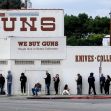Some gun restrictions that are commonly in place around the country include background checks, restrictions on gun ownership for felons, and gun licensing.
The National Instant Criminal Background Check System (NICS) is a phone system that a Federal Firearms Licensee (FFL) calls to do a background check on people who want to buy guns. This phone system is available 17 hours per day, seven days per week, except for Christmas. The NICS also has an E-Check system that is available 24/7. The NICS provides full service to 30 states, five U.S. territories, and the District of Columbia. They provide partial service to seven states. Thirteen states do their own checks through the NICS. The background check makes sure that the person buying a gun does not have a disqualifying criminal record or is ineligible to buy a firearm for another reason. This system started in 1998. Since then, it has done about 300 million background checks and has issued more than 1.5 million denials.
Due to a law passed in 1934 at the federal level, a person charged with a violent felony cannot own a firearm. The Gun Control Act of 1968 made it to where any person who had a felony- whether it was violent or not- could not own a firearm. At the state level, the rules vary. For example, in Indiana, you can go to court to have your gun rights restored. In Kentucky, you can file to have your record expunged five years after your sentence is completed. Expungement erases the felony from your record, making it like it never happened, which would make the person able to buy a gun.
The following states do not allow you to buy a gun if you have a felony on your record: Arkansas, California, Colorado, Connecticut, Delaware, Georgia, Illinois, Kansas, Michigan, Nebraska, Nevada, New Hampshire, New Mexico, Oklahoma, and Washington. States like Oregon and New York allow you to buy a gun if you have committed a felony under certain circumstances.
There is no national gun registry. Federal law prohibits having one. In addition, eight states prohibit having a gun registry at the state level. Hawaii is the only state that requires gun owners to register all guns. A few states require you to register only certain types of guns. Illinois, Massachusetts, and New Jersey require people to have a license for all guns. New York requires you to have a license for handguns.
There have been proposals to make background checks happen on a national level. The NRA is against expanding the system for background checks because “background checks don’t stop criminals from getting firearms, because some proposals to do so would deprive individuals of due process of law, and because NRA opposes firearm registration.” If there was a case where a person was denied due process due to expanding the background check system, the NRA would likely back this person and push to have this case heard by the Supreme Court, especially with the Supreme Court containing a majority of conservative judges.
The Supreme Court has decided to hear the case New York State Rifle & Pistol Association v. Corlett challenging the state law that if a person wants to be able to conceal carry any type of firearm, the person must show “proper cause.” The term “proper cause” has not been officially defined, but it has been interpreted by the New York courts to mean, “demonstrate a special need for self-protection distinguishable from that of the general community or of persons engaged in the same profession.” The rule only applies to handguns, not rifles or shotguns. A decision on this case will most likely be delivered around June 2022, although it could come sooner.
The case of New York State Rifle & Pistol Association v. Corlett could be a big win for gun rights advocates, especially with a majority conservative Supreme Court. What might it mean for some of the other common gun laws in place around the country if the High Court delivers a strong rebuke of New York’s law? People on both sides of the gun debate are wondering.






